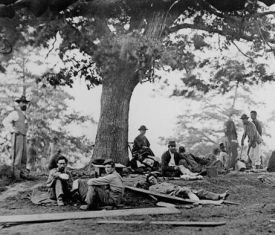Southern Baptists on the home front are fed a steady diet of depressing news from Confederate Army camps. The bearers of the bad news in the Southern Baptist press are soldiers, army chaplains, army missionaries, army evangelists and news correspondents. In addition to death and illness, lamentations regarding army camps decry the sin and decadence, while holding out hope that the Gospel may yet transform the nation’s troops into an army of piety and righteousness. Christian soldiers are envisioned as both better warriors in the killing fields, men who are devoted to the holy cause of the Confederacy with the assurance of heavenly victory should they die by bullet or sickness on earth.
Jesse H. Campbell, veteran Georgia Baptist pastor and currently an army evangelist, labors among Confederate soldiers in the vicinity of Savannah, striving to transcend the darkness. Today’s Christian Index profiles Campbell and offers firsthand observations of camp life.
“His locks are silvered and his graceful form shows the unmistakable marks of the weight of years,” it is observed of the minister. Yet “his trumpet-like voice is strong and falls on the ear with refreshing mellowness of the gentle summer shower upon the ploughed land.”
Preachers in the army camps face formidable circumstances; Campbell rises to the challenge.
When we consider the unfavorable circumstances for preaching in the camp–the soldiers have but a few camp stools, they meet in the open air, in the sunshine or cold, stand or sit on the broad bosom of mother earth, and listen to the sweet sound of the gospel flowing from the lips of the faithful minister, as tho’ they were hearing an apostle of Jesus Christ, his extensive acquaintance, his acknowledged ability, his established character, his zeal for the cause of God, his love and tender sympathy of soul for soldiers, secures for him on all occasions the most earnest and profound attention. It is not the first time he has labored in my field and I hear of his faithful ministrations among the soldiers in and around Savannah….
[The soldiers] inquire of me, will he continue to labor among us; when will he come again? All of which shows with what delight they listen to his flowing eloquence, when pointing them to the gracious Redeemer. There are many regiments without chaplains. It is not every man who can preach acceptably at home that can command continued respect from the soldiers. He must have special qualifications that fit him for the work. These qualifications Brother Campbell has in the highest degree of excellence. The preacher must be a patriot. He must be a good man; he must have a tender sensibility of soul, ready to weep with those who weep, and rejoice with those who rejoice; he must understand human nature; he must go among the men as father and brother; he must have the wisdom of the serpent and the harmlessness of the dove. When these qualifications are possessed, the man of God has the most inviting field for usefulness that is now to be found in the length and breadth of our distressed land. He can instill patriotism into the minds of soldiers more successfully than any other man–can have the greatest influence over men for good, in every sense of the word.
God and good is certainly in need in the Confederate camps.
Wickedness prevails to an alarming extent; profane swearing, vulgar and obscene language, card-playing, chuck-o-luck [a dice game], and, in a word, every vice and sin which debases and degrades man is witnessed in the camp. Our men are exposed hourly to temptation, and while enduring privations and in peril by day and night–diseases thinning their ranks–our country invaded by a cruel and unfeeling enemy, that threatens to take our homes, our liberty and reduce us to the lowest degradation ad subjugation, should be cared for, labored with, and instructed in the pure doctrine of the blessed Redeemer and his apostles, that they may be ready to meet death on the sick and homely couch of the soldier, or brave death amid the roar of cannon and rattling of artillery, in the confused noise of battle, and garments rolled in blood, where so many of our fathers, brothers and sons have been made to kiss the mother earth; how many more will have to go to the soldier’s grave before this unrighteous war is brought to a close, the future must decide.
Sin, privation, sickness, blood, and even death — yet hope prevails, embodied in the form of a silver-haired army evangelist preaching the Gospel and searching for signs of revival.
Source: “Rev. J. H. Campbell,” Christian Index, April 6, 1863



